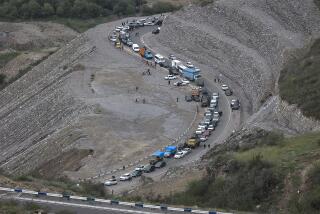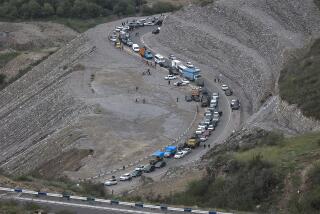Turkey and Greece Enter ‘New Era’ With Accords
- Share via
ANKARA, Turkey — Prodded by two earthquakes and back-to-back visits by President Clinton, Greece and Turkey retreated from old animosities Thursday by pledging to work together to fight terrorists, lure tourists and bid for the right to co-host a European soccer championship.
Foreign Ministers George Papandreou of Greece and Ismail Cem of Turkey signed five agreements here after seven months of quiet diplomacy that both sides call the most serious effort in more than a generation to bury a history of conflict and suspicion.
Both men said they hoped the accords will build enough trust to help tackle the most sensitive disputes between the neighboring North Atlantic Treaty Organization allies--over rival territorial claims in the Aegean Sea and over how to reunify ethnic Greek and Turkish communities on the partitioned island of Cyprus.
“It is a successful beginning, a new era in our relations,” Cem told reporters in a joint appearance with Papandreou, whom he addressed as “my colleague, my friend.”
Turkish Prime Minister Bulent Ecevit indicated the next step in the budding rapprochement by inviting his Greek counterpart, Costas Simitis, to visit Turkey later this year.
One accord signed Thursday pledges Greece and Turkey to join forces against terrorism, organized crime, drug smuggling and illegal immigration. Others call for cooperation to protect the environment, promote investment and encourage tourism, including package tours to both countries.
The ministers also decided, subject to approval by their national sports associations, to launch a joint bid to host the European soccer championship in 2008. In addition, Greece said it will invite Turkish performers to help entertain at the 2004 Olympic Games in Athens.
Even such modest steps would have been unthinkable a year ago. The two countries went to the brink of war in 1996 over a tiny disputed island in the Aegean, and relations hit another low last February when Greece was discovered to be harboring Turkey’s most wanted man, Kurdish guerrilla leader Abdullah Ocalan, at its embassy in Kenya.
But the Ocalan case, which ended with the guerrilla’s capture by Turkish special forces, proved to be a positive turning point for diplomatic relations. It led to the resignation of Greek Foreign Minister Theodoros Pangalos, a flamboyant hard-liner who once denounced Turks as “thieves and rapists.”
Papandreou replaced him and quickly developed a rapport with Cem. Both men are foreign-educated intellectuals who shun demagogic rhetoric and speak on the phone every few days.
They began informal, low-profile meetings in June, after Turkey stopped insisting on an anti-terrorism agreement as a condition for a broader dialogue. It took earthquakes in both countries in August and September to push Greeks and Turks toward a more genuine friendship. Each sent rescue teams to help the other, and their gestures inspired cross-border visits by entertainers and business executives.
To encourage the relationship and help stabilize the southern Balkans, Clinton visited both countries in November and urged Greece to drop its objection to Turkish membership in the European Union. The EU voted last month to accept Turkey as a candidate.
The improvement in ties has been so rapid that both foreign ministers voiced concern Thursday over rising popular expectations. Warning that disputes over the Aegean and Cyprus will take time to resolve, they deliberately avoided what Papandreou called “megaphone diplomacy”--spelling out their differences in public.
Instead, Cem proposed “a set of military goodwill measures,” including a reduction of military flights over the Aegean by both countries, joint exercises and naval visits to each other’s ports. Papandreou said Greece would study the idea.
Both men voiced support for U.N. efforts to persuade the ethnic Greek and Turkish leaders on Cyprus to resume direct negotiations that broke off in 1998. Greece and Turkey are divided over the Turkish Cypriots’ claim of separate statehood for the northern third of Cyprus, which has been occupied by Turkish troops since 1974.
More to Read
Sign up for Essential California
The most important California stories and recommendations in your inbox every morning.
You may occasionally receive promotional content from the Los Angeles Times.













